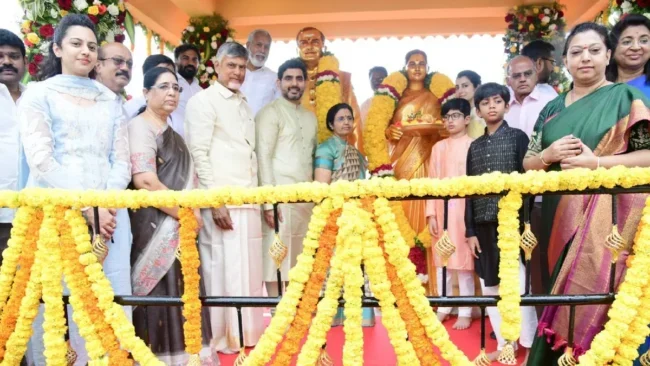Aging Population Concerns: Andhra Pradesh CM Advocates for Larger Families
Andhra Pradesh Chief Minister Nara Chandrababu Naidu has reignited discussions about aging population concerns, urging families to consider having more children to address potential demographic challenges. Speaking at his native village, Naravaripalli near Tirupati, during the Sankranti festival, Naidu emphasized the need for proactive policies to avoid the consequences of an aging population, a problem faced by many developed nations.
Learning From Global Aging Population Concerns
Naidu highlighted that countries like Japan, South Korea, and several in Europe, which previously incentivized family planning policies, are now grappling with declining fertility rates and an aging population. To counterbalance these issues, many of these nations are welcoming immigrants, including Indians, to sustain their workforce and economic growth.
“This should serve as a wake-up call for India,” Naidu cautioned, noting that India’s focus on limiting family size could lead to similar challenges in the future. He stressed the importance of adjusting policies to ensure India reaps demographic dividends by 2047.
Policy Changes in Andhra Pradesh to Address Aging Population
During his interaction, Naidu referenced the past rule in Andhra Pradesh that barred candidates with more than two children from contesting panchayat and local body elections. The TDP government repealed this rule in August last year, paving the way for more inclusive political participation. In a forward-thinking suggestion, Naidu proposed introducing policies to disqualify candidates with fewer children from running for office, aiming to shift societal perspectives on family size.
Naidu’s stance has sparked national debate, with Tamil Nadu Chief Minister MK Stalin echoing similar sentiments. Stalin has also urged Tamil Nadu families to consider having more children to address declining fertility rates.
Declining Fertility Rates in South India
South Indian states, including Andhra Pradesh and Tamil Nadu, have strictly adhered to the two-child family policy for decades. As a result, the total fertility rate (TFR) in these states has dropped to 1.73, well below the national average of 2.1. In contrast, five northern states—Uttar Pradesh, Madhya Pradesh, Bihar, Rajasthan, and Jharkhand—have a TFR of 2.4, exceeding the national average.
The declining fertility rates in South India demonstrate the effectiveness of family planning policies. However, Naidu and other leaders argue that the long-term implications, such as an aging population and workforce shortages, require immediate attention.
National Perspective on Aging Population
India’s National Population Policy, introduced in 2000, aimed to reduce TFR to replacement levels (2.1) by 2010, achieving a stable population by 2045. However, the National Family Health Survey (2019-2021) revealed that India has already achieved a TFR below the replacement level, signaling a declining population growth rate.
While this achievement aligns with the policy’s objectives, it raises concerns about the future. A population that fails to replace itself could face economic and social challenges, including workforce shortages and increased pressure on healthcare systems to support an aging demographic.
Addressing Aging Population Concerns With Proactive Policies
Naidu’s appeal for larger families highlights the need for a balanced approach to population management. While India has made significant strides in reducing fertility rates, leaders must now address the potential repercussions of an aging population. Policies encouraging larger families, combined with measures to support aging citizens, could help India maintain a stable demographic structure.
The discussions sparked by Naidu and echoed by other leaders underscore the importance of proactive planning to secure India’s demographic and economic future. As global examples demonstrate, addressing aging population concerns early can prevent long-term challenges and ensure sustainable growth.







